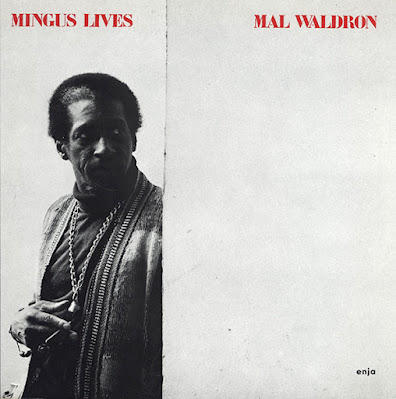Record date: March 10, 1970
When Sam records released their Antibes recording of the Billy Harper Quintet I was very, very happy. I decided to e-mail Sam records producer Fred to give him my compliments for releasing such a beautiful piece of art. I decided to mention Mal's name as he recorded a lot in France during his live hoping Fred might ever do a Mal Waldron record. I didn't actually think it was going to happen but Fred kindly replied Mal was on his radar and that he intented to release a previously unreleased record by Mal at the end of the year 2023. It got some delay but here it is: an unreleased Mal Waldron record, recorded during his prime years live in Paris.
1970 was the year he just released his classic 'Free at Last' album. Mal was back on track from his mental breakdown in 1964, recording and composing music from 1965 after he settled in Europe: first in Italy, later in Germany and eventually in Belgium. Mal was on tour with various bands in the late '60's and played gigs with his own groups as well. He worked a lot with local musicians that never gained any real fame but were clearly selected on their excellent musicianship. 'Rat Now... Paris '70 is a recording of such an occasion: a live session with two French musicians, of whom Christian is best known as the drummer of the band Magma. The album was recorded just after his first extensive Japan tour in January and February of that year where he recorded Tokyio Reverie and Tokyo Bound. This live concert revisits one of the fascinating compositions of that last mentioned session. 1970 was also the year of records like 'Blood and Guts', 'The Opening' and 'Spanish Bitch'. A year of creative and artistic development of Mal and his music.
This session is fascinating for its compositional choices as three of them never appeared on record again after their original releases Free at Last and Tokyo Bound. There's also Champs-Elysees where Mal makes a rare revisit to one of his classic Prestige compositions and recordings. Both Rat Now and Rock my Soul are from the ECM album 'Free at Last'. They have that typical Mal Waldron swing: it's funky, a little edgy here and there but very, very catchy. Both Catoire and Vander are keeping up with Mal very well and there's plenty of space for them to improvise and seek interaction with the pianist but also duelling each other. Christian Vander gives Mal exactly that rhytmhic support his playing desires. Champs-Elysees is an interesting experience hearing Mal playing his new style over his old composition giving it a both refreshing but also very familiar sound. It gets defined in a different way: in Mal's new way of musicianship. Then at last there's the Tokyo Bound composition: Mount Fujiyama which represents a different atmosphere and side of Mal's playing. It's meditative in a more calm way with clear Japanese influences on the composition. With it's more relaxed tempo it gives Mal more space to play with his improvisitional ideas that are often repetitive and bluesy but never dull or predictible.
Now the question is of course: does this record has that typical hypnotical Mal Waldron chemistry that sucks you right in to the music? The dark lyricism, emotional depths, high level intensity, bluesy feeling? It's all right there. If you like those other albums mentioned in this review from this period this is mandatory stuff. It's another piece of that huge Mal Waldron puzzle.
Last words on the packaging and sound quality. I haven't heard or seen a bad Sam record yet. It's a lovely one man record label from Paris, France that put's music in the first place. The lp is packed in a very solid gatefold with a lovely photograph of Mal in Paris. The sound quality is amazing A+. It's not only greatly recorded but also greatly remastered and cut, by Kevin Gray of course so that means something. Fred Thomas did an amazing job contributing to keep Mal's legacy alive and more known to more jazz listeners.



















